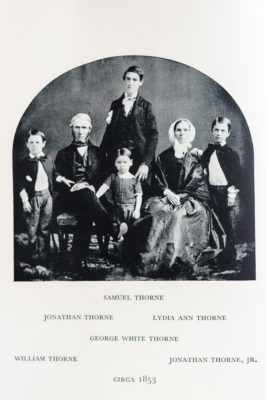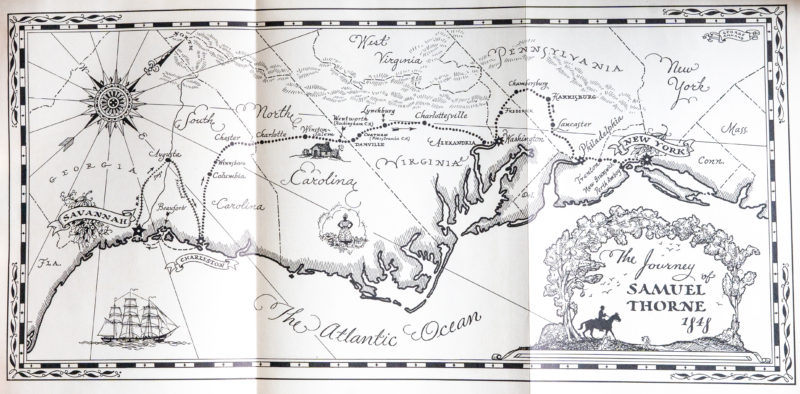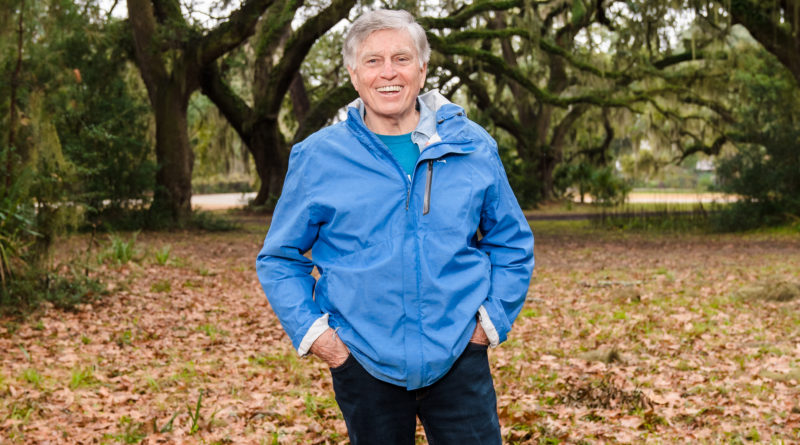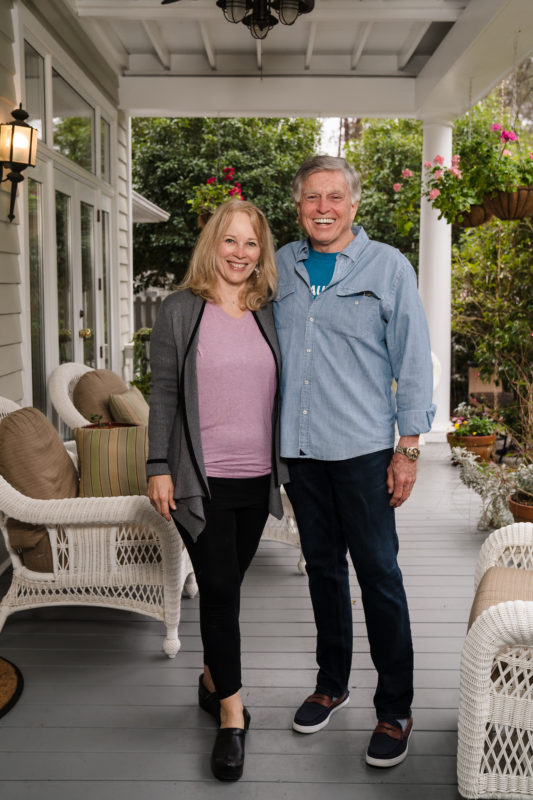Landon K. Thorne III
Investing in the Lowcountry One Film at a Time
story by LINDSEY LENOIR photos by SUSAN DELOACH
In preparation for the 15th Annual Beaufort International Film Festival (BIFF), sponsors and film society members alike are preparing to welcome aspiring filmmakers, producers, and actors to our waterfront town. The five-day event will conclude with an awards ceremony in recognition of the hard work and dedication of those resolute to expressing artistry through film. One of those awards is the BIFF Pat Conroy Lifetime Achievement Award given to an individual who has dedicated a lifetime, in one capacity or another, to the art of filmmaking. Unfortunately, this year the award will be withheld due to the safety and wellness concerns of the recipient. Behind the festival and each award are sponsors that are crucial to the festival’s success. One local sponsor has devoted himself to doing more than just recognizing great filmmaking. He is setting out to ignite, endorse, and invest in ambitious filmmakers to continue an art form that he admires greatly in a town that has captivated him since childhood.

Landon K. Thorne III had a rather novel upbringing and was tethered to the Lowcountry generations before he was even born. He invited me to journey with him through the pages of his lineage: “My family has had a long-standing relationship with Beaufort County … we are talking two hundred years.” The first of his forebears came down to the area in the early 1800s. At the age of thirteen, Landon’s great-great-grandfather made the journey with his father to purchase cowhides for the family’s leather business. On this trip in particular, the pair would purchase a Marsh Tacky horse. The younger Thorne would end up riding the horse alone back to the family farm in Millbrook, NY. The Thorne family would go on to solidify their legacy in Beaufort County when Landon’s great-grandfather purchased the Tomotley Plantation. As a young boy, Landon would cultivate his own connection to the Lowcountry during memorable visits to his family’s plantations. His grandfather owned Honey Horn Plantation on Hilton Head. He speaks admirably about this time in his life: “My grandfather and his brother-in-law, Alfred Loomis, owned most of Hilton Head Island until the 1950s. As a small child, I experienced the Lowcountry at Honey Horn. Once you get the pluff mud between your toes, it’s always in your heart!”
Landon Ketchum Thorne III was born in New York City. His father, Landon K. Thorne Jr., deposited his wife in New York City just before boarding a ship to serve his country in WWII. A mere nine months later, his namesake would arrive into a world of which he would one day set out to conquer on his own. That was only the beginning. Much of the youth of Landon K. Thorne III was spent in Italy. “My father was a banker and became a financial diplomat assigned to the embassy in Rome, where he ran the Marshall Plan,” a U.S. program that provided aid for Europe to help finance a rebuilding effort following the devastation of World War II. For the better part of his youth, the family would live in Italy. They would return stateside a few years before a young Thorne would go to college. “I attended prep school, which really didn’t suit me, because I had been in this multicultural world. As a little kid, I almost had this Lowcountry patois on my tongue, and then we moved to Italy and I spoke Italian better than I spoke English.” Landon had been essentially raised European, and going to an American prep school was vastly different from what he was accustomed to. Eventually, he would find himself at Yale in a pre-Vietnam state of the union. He knew that upon graduation, he would have to make a decision. “The year I graduated from Yale was the spring of the largest draft calls for Vietnam. The war had gone from a very mysterious thing when I started college to a very real thing by the time that I graduated.” Landon says that he had always had a spark in his mind about film, so before committing to the war effort, he managed to squeeze in a semester at the New York University Film School. It was an experience that would plant a seed in Landon that he wouldn’t water until later in life.

The Road Back Home
Upon returning from his combat tour in Vietnam, Landon knew what his first choice in duty stations would be: Parris Island and a chance to go back to his beloved Lowcountry. “I knew in my lifetime that I would eventually come back to the Lowcountry in a more permanent way.” He loved the sporting life, and as a young Series Commander on the drill field, in his words, he “had time to quail hunt, fish, raise a little devil, and bark at the moon.” As time evolved, the flexibility of his Reserve commitment allowed him to cultivate a successful financial business while concurrently continuing in the multicultural world that he grew up in, which he continues to this day. The momentum of his business career would push Landon to make the difficult choice to go inactive with the Corps for a while in order to focus on his work with an international trade organization that took him all over the world. Soon after, he would marry and begin to grow a family.
 Traveling ended up not being conducive to raising a family, so Landon decided to change tracks, focus more on merchant banking and finance, and reactivate with the Reserves. “Being a Marine officer with a burgeoning business career became a balancing act of maintaining a successful business and advancement in the Marine Corps, and many of us managed to do it.” By the late 80s early 90s, most of the Marine Corps Reservists had mobilized for Operation Desert Storm. Landon served in an intelligence task force, having been mobilized on the heels of taking a company public while concurrently building up a franchise movie rental company known as Blockbuster Video. By this time, Landon and his young family were living in South Florida, and as Landon calls it, “One of those happy life events happened!” By the mid-90s Landon had sold his Blockbuster holdings and was able to disengage from the investment company he was working for and relocate back to the Lowcountry. Landon says, “We were really able to move anywhere by that point, but I knew I wanted to move back to South Carolina. When we moved back, we settled on Brays Island. Those memories made from early childhood just never left me.”
Traveling ended up not being conducive to raising a family, so Landon decided to change tracks, focus more on merchant banking and finance, and reactivate with the Reserves. “Being a Marine officer with a burgeoning business career became a balancing act of maintaining a successful business and advancement in the Marine Corps, and many of us managed to do it.” By the late 80s early 90s, most of the Marine Corps Reservists had mobilized for Operation Desert Storm. Landon served in an intelligence task force, having been mobilized on the heels of taking a company public while concurrently building up a franchise movie rental company known as Blockbuster Video. By this time, Landon and his young family were living in South Florida, and as Landon calls it, “One of those happy life events happened!” By the mid-90s Landon had sold his Blockbuster holdings and was able to disengage from the investment company he was working for and relocate back to the Lowcountry. Landon says, “We were really able to move anywhere by that point, but I knew I wanted to move back to South Carolina. When we moved back, we settled on Brays Island. Those memories made from early childhood just never left me.”
The Marine Corps Reserves were changing at this point from, “Your classic weekend warrior, two weeks in the summer, to a force that was very active.” Landon Thorne was now a Colonel in the Corps and preparing to phase out when 9/11 happened. At that time, he was called back up, but was soon confronted with life-altering changes in his personal life. So, in 2002 Colonel Thorne retired: “I saluted the flag and marched off the parade deck.” Shortly after his retirement, his wife, Missy, passed away, and he became a single parent to a teenager. Concurrently, he and two partners undertook a major real estate development in Beaufort that included The Preserve Apartments in Port Royal Center and the Keyserling Cancer Center while also morphing his long and successful finance/banking career more toward venture capital.
New Beginnings
Life marched on, and Landon Thorne III would eventually remarry. Leslie Evans Thorne was born and raised in Connecticut “on the coast, about an hour train ride from New York City.” She graduated from Middlebury College. She moved to the city and has since had a full career as a highly accomplished work-life coach. She went from the high stakes, fast-paced streets of New York City to the laid back, deep breathed, canter of the Lowcountry. Leslie was able to make the transition and enthusiastically bring her successful career along. The couple and their Greater Swiss Mountain Dog, Pasha, are blissfully happy — enjoying their front porch views of the salt marshes of the Haulover Creek, a tributary of the Pocotaligo River.
The Next Adventure
Opportunity has a way of finding those ambitious, driven, and grateful individuals in life. For a venture capitalist and a successful professional work-life coach, it knocked in a rather unconventional way. Landon has spent much of his career guiding others toward wise investments and ingenuity, while remaining grateful to those who helped him along the way. His life’s work and his personal experiences with loss afforded him the ability to look at life through a different lens. “I have dealt with a great deal of loss, but life forges on. Everything that happens to you, whether good, bad, or indifferent, adds to your bank of wisdom and to your understanding of gratitude.” Landon speaks of his gratitude, in this circumstance, for his wife Leslie. Leslie and Pasha were the catalysts for an opportunity to reconnect Landon to his love of filmmaking. He retells the story of how Leslie saw a notice that a movie was to begin filming in Beaufort in which the protagonist was a dog. Leslie did what all good dog moms would do and immediately took Pasha to the audition. A few days later the couple and Pasha were headed to the mountains when they got the callback! Landon chuckles, “I have to credit Leslie and Pasha for energizing me back to becoming active in the film scene in Beaufort. Leslie has been an enthusiastic partner in all of this.” The ability to utilize their resources and knowledge has allowed the couple to help and invest in the dreams of others. “In the last decade or so, helping people realize their dreams, this is a time to do that for others where many people have done that for me,” Landon says.
Investing in the dreams of others has been difficult in the current climate of filming in South Carolina. Lack of incentives and legislative support has caused many in the industry to pass over towns like Beaufort for location filming. Beaufort had virtually dropped out of sight in the wake of major blockbusters like Forrest Gump and The Prince of Tides due to lack of film incentives offered by the state. “Where other states were gaining momentum, Beaufort had just faded away from the movie scene.” Landon and Leslie began to involve themselves with Ron and Rebecca Tucker, who have made the Beaufort International Film Festival their life’s work. Landon expresses, “Through thick and thin, their dedication to film has bridged the gap in the filmmaking desert that has become South Carolina and, in particular, our beloved Lowcountry.”
Landon and Leslie started to attend the film festivals, and then began supporting the film festival and sponsoring prizes. They started talking to some of the filmmakers and began to realize that the whole economics of films and filmmaking “had been flipped on its head!”
According to Landon, “Theaters are closed now and so streaming platforms are momentarily more important than theaters, but streaming hasn’t yet caught up to the revenues from theatrical release. We’re not sure how quickly the theater business will recover in the wake of COVID. In talking to some young filmmakers, I have emphasized the importance of keeping the budgets realistic.” Gleaning from his venture capitalist mindset, Landon began to share his knowledge. He decided, “I would take small but sufficiently meaningful bites of modestly budgeted pictures, and get to know these young directors and producers, and add value where I can.” One thing led to another, and he was able to be a part of Night Into Day by director Ben Hall. It is streaming now on Amazon and is about to be released on other platforms. Night Into Day is a remarkably tight film, done on a very small budget. He has also been an integral part of a project that has come out of Beaufort, still in production, called Bobcat Moretti and directed by Rob Margolies, It stars Tim Realbuto, who won the best actor award at the festival last year for his role in Margolies’ film, “Yes.” “Bobcat Moretti” is a film about reconstituting yourself: “The son of a famous boxer named Bobcat Moretti attempts to reinvent himself and continue the legacy of his father while using boxing to get himself fit.” There is a whole existential health and wellness aspect to the filming of this project. “You see, filming is currently paused while Tim is putting in the work toward losing one hundred pounds, of which he has already shed seventy-five. There will be a global campaign promoting his lifesaving journey. The lead actress in the film is Vivica A. Fox.”

Prior to his current projects, Landon and Ron Tucker came up with the idea of an incubator program to gain local support for the industry and to allow some of the young filmmakers to get their films made. A pursuit that unfortunately resulted in many closed doors. However, as Landon has learned during his time in the Marine Corps, “if you are doing reconnaissance and you run into a superior force, don’t attack it and get wiped out. You fall back, look for a different way and go at it again. I just realized at this stage, this was not something we were going to be able to put together. So, I decided to do it myself and begin to build a portfolio of credentials to demonstrate that we can make good movies and to show that we can recoup a good bit of the investments and just see how well we do. Also, I want to help Ron and Rebecca demonstrate that the BIFF can be an engine of opportunity. I have utilized my venture capital knowledge of diversification. Even in film, if you’re going to attract investors, you have to have an idea, a plan, and a way that mitigates risk across the spectrum. Right now, I’m in the ‘pre-seed’ stage of building a portfolio of credibility.”
In modern portfolio theory, the risk vs. return matrix applies to a base level understanding of investments. Sometimes, the most fulfilling investments come with a great deal of risk. Of all people, Landon K. Thorne III understands this concept, “If I can achieve macro influence: changing tax incentives and garnering state wide support so we are more robust as a state, and then micro: as in, on a city level; welcoming filmmakers. Then, I believe we can generate belief and support for responsible filmmaking by elevating local awareness in Beaufort. We must do this in order to bring back the energy that drove the making of the classic films once shot here.”
Landon’s hope is that the local community will begin to recognize the compounding revenue opportunities that will occur by simply opening its arms to the film industry. “While the state is making its decisions, we can still attract filmmakers to the area.” Filmmaking doesn’t need smokestacks, and it can contribute broadly to the local economy. It’s also fun, dynamic, and something that will keep Beaufort in the center of the ballgame, and to do that requires a plan.” A plan is exactly what Landon K. Thorne III has, “I hope to work with Ron, Rebecca, and many others so that we can build what amounts to a powerful green industry here. An industry that will add value to the entire community. Really, the end state is building an industry here; a green industry, a soft industry. That’s really the next step!”






